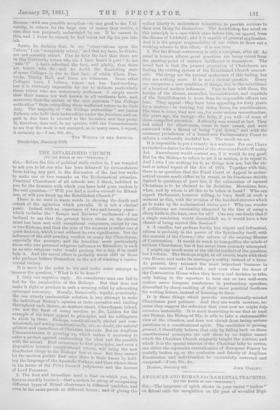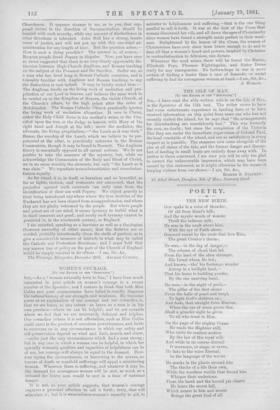ANGLICAN AND ROMAN SACRAMENTAL TEACHING.
[TO TRH EDITOR OF THE SPECTATOR:1
Sias—The largeness of spirit shown in your recent " leaders " on Ritual calls for recognition on the part of so-called High Churchmen. It appears strange to me, as to you, that sup- posed excess in the direction of Sacramentalism should be treated with such severity, while any amount of disobedience in other directions is tolerated. John Bull has a strong, innate sense of justice, and will not put up with this one-sided ad- ministration for any length of time. But the question arises,— How is such a thing possible P The answer is, of course,— Because people dread Popery in disguise. Now, you have once or twice suggested that there is no very clearly appreciable dis- tinction between High-Church Anglican, and Roman teaching on the subject of the Presence and the Sacrifice. Suffer me, as a man who has lived long in Roman Catholic countries, and is tolerably familiar with Anglican and Roman teaching, to say the distinction is vast indeed. It may be briefly stated thus:— The Anglican dwells on the living work of mediation and pro- pitiation of our Lord in heaven, and believes the same work to be carried on in the Kingdom of Heaven, the visible Church, at the Church's altars, by the high priest after the order of Melchizedek. The Roman Catholic Church practically ignores the living work of mediation altogether. It sees in Christ, either the Holy Child Jesus in his mother's arms, or the Cru- cified -upon the tree, or the Judge in heaven, with Mary at his right hand and Joseph at his left ; never the mediator, the advocate, the living propitiation,—" the Lamb as it was slain." Hence, the worship of the Lamb, which we believe to be per- petuated at the altar, is practically unknown in the Roman Communion, though it may be found in Bossuet. The Anglican theory is essentially opposed to all carnal notions. We do not profess to take the measure of the mystery, but, while we acknowledge the Communion of the Body and Blood of Christ, we in no sense worship the elements, but only " the Lamb as it was slain." We repudiate transubstantiation and consubstan- tiation equally.
As for ritual, it is, in itself, so harmless and so beautiful, as far as lights, incense, and vestments aro concerned, that the prejudice against such externals can only arise from the identification of their use with Popery. We object gravely to their being introduced anywhere where the true doctrine of the Eucharist has not been cleared from misapprehension, and where they are not gladly welcomed by the people. But where people and priest are of one mind, it seems tyranny to forbid what is in itself innocent and good; and surely such tyranny cannot be persisted in, in the nineteenth century, in England.
I am satisfied, speaking as a barrister as well as a theologian (however unworthy of either name), that the Rubrics are so worded, probably intentionally (from the strife of parties), as to give a considerable measure of latitude in what may be called the Catholic and Protestant directions ; and I must hold that any narrow line of policy on the part of the Church of England would be simply suicidal iu its effects.--I am, Sir, &c.,
The Vicarage, Rhayader, December 29th. AMMER C (?11NEY.







































 Previous page
Previous page